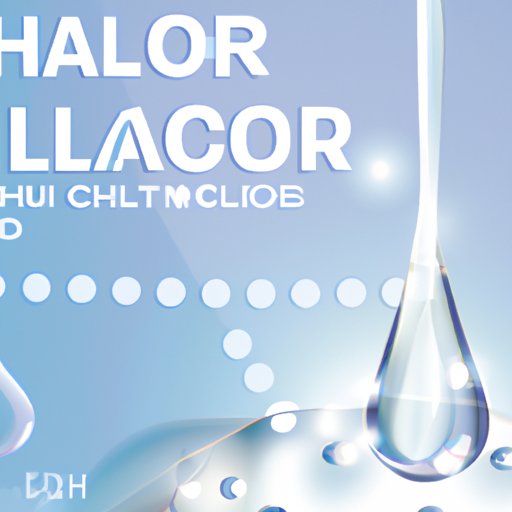Introduction
Hyaluronic acid is a natural substance found in the body that has numerous benefits when applied topically to the skin. It’s often used in skincare products, such as moisturizers and serums, to help keep skin hydrated, improve its texture and appearance, and reduce signs of aging. In this article, we’ll explore what hyaluronic acid does for your skin, from understanding the science behind it to finding the best products and application methods.

Explaining the Benefits of Hyaluronic Acid for Skin Hydration and Health
Hyaluronic acid helps to keep skin hydrated by drawing water from the environment and trapping it within the skin. This helps to maintain a healthy moisture balance and prevent dryness. Additionally, it helps to repair damaged skin cells and promote the production of collagen and elastin, both of which are essential for maintaining healthy skin.
The impact of hyaluronic acid on skin health and appearance is evident almost immediately after use. Skin will become more supple and plump, and have a smoother, softer texture. Over time, wrinkles and fine lines will become less pronounced and the overall complexion will appear brighter and more even.
How Hyaluronic Acid Helps to Prevent Aging in Skin
Hyaluronic acid is also a powerful anti-aging ingredient. It helps to reduce the appearance of wrinkles and sagging skin by boosting collagen production and helping to retain moisture within the skin. Additionally, it can help to protect the skin from environmental damage, such as sun exposure, pollution, and other irritants. As a result, the skin will look younger and healthier.
The Impact of Hyaluronic Acid on Sensitive Skin Types
Hyaluronic acid is generally safe for all skin types, including those with sensitive skin. However, it’s important to understand why it’s important for sensitive skin and how to choose products suitable for this type of skin. Hyaluronic acid helps to soothe irritated skin and reduce redness, while also providing intense hydration. Additionally, it helps to strengthen the skin barrier to protect against further irritation.
When choosing products with hyaluronic acid for sensitive skin, it’s important to read the labels to make sure they don’t contain any harsh or irritating ingredients. Additionally, look for products specifically designed for sensitive skin, as these will be gentler on the skin and provide more effective results.
A Guide to Choosing the Right Hyaluronic Acid Products
There are many different types of hyaluronic acid products available, including serums, creams, lotions, gels, and masks. Each one has its own benefits and should be chosen based on the individual’s needs. For example, serums are great for targeting specific areas of the face, while creams and lotions are better suited for larger areas of the body.
When shopping for hyaluronic acid products, it’s important to read the labels and make sure the product contains an adequate amount of hyaluronic acid (at least 1%). Additionally, check for other beneficial ingredients, such as antioxidants and vitamins, as these will help to maximize the effects of the hyaluronic acid.

Understanding the Science Behind Hyaluronic Acid and Skin Health
Hyaluronic acid is a naturally occurring substance found in the human body, as well as in certain foods like soybeans and mushrooms. It’s made up of two types of molecules: high molecular weight hyaluronic acid (HMWHA) and low molecular weight hyaluronic acid (LMWHA). HMWHA is too large to penetrate the skin, so it remains on the surface and provides immediate hydration. LMWHA, on the other hand, is small enough to penetrate the skin and provide long-lasting hydration and anti-aging benefits.
In addition to providing hydration and anti-aging benefits, hyaluronic acid also helps to protect the skin from environmental damage and irritation. It forms a protective barrier over the skin and helps to lock in moisture, while also reducing inflammation and soothing sensitive skin.

Tips for Applying Hyaluronic Acid to Achieve Maximum Results
Applying hyaluronic acid correctly is key to achieving maximum results. Before applying the product, it’s important to cleanse and prepare the skin. Cleansing will remove dirt and impurities, while exfoliating will help to remove dead skin cells, allowing the hyaluronic acid to penetrate deeper into the skin. Once the skin is prepared, apply the hyaluronic acid product evenly across the face or body and massage it into the skin until it is fully absorbed.
It’s also important to note that hyaluronic acid works best when used in combination with other active ingredients, such as antioxidants and vitamins. Using a product that contains multiple beneficial ingredients will help to maximize the effects of the hyaluronic acid and ensure optimal results.
Conclusion
Hyaluronic acid is a naturally occurring substance that can be beneficial for skin health. It helps to keep skin hydrated and reduce signs of aging, while also protecting the skin from environmental damage and irritation. When used correctly, it can help to improve the overall appearance and health of the skin. To get the most out of it, it’s important to choose the right products and apply them properly.


